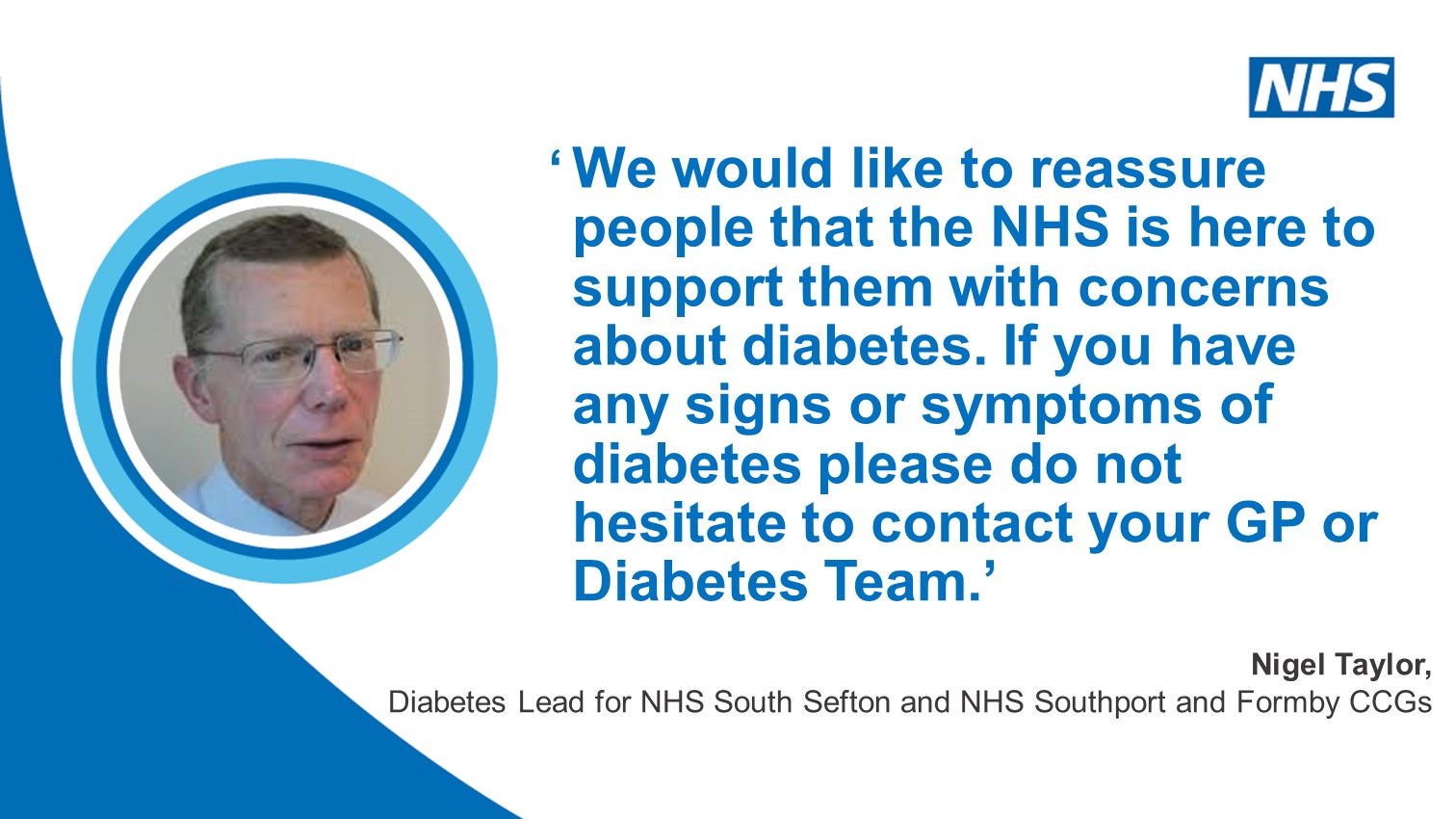Health organisations across Sefton join forces to encourage people to be diabetes aware and access support
Tuesday, June 9, 2020

Sefton health professionals have come together this Diabetes Week (8-14 June) to raise awareness of the condition and the support available for residents living with it during the coronavirus pandemic. They have called on people with diabetes to access the help available to them, including a new dedicated helpline and online tools to help manage their condition during the outbreak.
Diabetes causes a person’s blood sugar level to become too high, due to ineffective control by a hormone called insulin. The two types of diabetes are:
Type 1: Where the body’s immune system attacks and destroys the cells that produce insulin.
Type 2: Where the body does not produce enough insulin, or the body’s cells do not react to insulin. This is the most common type of diabetes.
The ‘4T’s highlight symptoms to look out for, as they may be a sign of diabetes. They include:
- Toilet - Going to the toilet a lot, bed wetting by a previously dry child or heavier nappies in babies
- Thirsty- Being really thirsty and not being able to quench the thirst
- Tired- Feeling more tired than usual
- Thinner- Losing weight or looking thinner than usual
Diabetes Week is a chance for health partners in Sefton to highlight the results of new NHS research. It found that people living with diabetes face a significantly higher risk of dying from coronavirus or COVID-19, with a third of deaths in England associated with the condition.
Nigel Taylor, Diabetes Lead for NHS South Sefton and NHS Southport and Formby Clinical Commissioning Groups (CCGs), said:
“In Sefton around 16,797 of adults have diabetes and approximately 2 per cent of these are predicted to be living with it unknowingly. The condition can lead to other serious health problems including strokes, heart disease and there is a higher risk of dying from COVID-19.
“This can be really worrying news, but we would like to reassure people that the NHS is here to support people with concerns about diabetes. Video consultations and online appointments, as well as routine discussions with GPs, are among a range of measures that the NHS has adopted so that diabetes care can continue throughout the pandemic. If you have any of the ‘4T’s symptoms of diabetes, please do not hesitate to contact your GP or diabetes team.”
A dedicated diabetes helpline, to advise those who need help with insulin and are unable to reach their usual hospital or community care team and need immediate clinical advice,– has been introduced by Diabetes UK and its partners.– 0345 123 2399 (Mon - Fri 9am to 6pm).
Arrangements have been made for patients to receive additional support from online education services for Type 1 and Type 2 diabetes to help them to manage their condition better.
Lesley Truman, Diabetes Specialist Nurse for Mersey Care NHS Foundation Trust said: “Whether you have recently been diagnosed, or you’ve been living with diabetes for years, it can be a lot to deal with on your own. It’s important that our residents know that there is support and advice is available to help them to prevent and manage diabetes.”
“Please, contact your GP practice or local diabetes team if you have any concerns about your diabetes. The NHS is here to help.”
Michelle Nolan, Service Manager at Curzon Road Medical Practice, Southport, said: “NHS staff have been working together to ensure that people can still access diabetes support and advice while responding to COVID-19 pandemic. Community teams are using technology such as online and video consultations to continue to support patients remotely.
“If you have diabetes and have been contacted by a specialist eye or foot care team, please go to your appointments to receive treatment and to avoid these problems getting worse. Our clinics are taking extra precautions to ensure the safety of staff and patients.”
Margaret Jones, Interim Director of Public Health for Sefton said: “Managing your weight, exercising regularly, eating a balanced diet, quitting smoking, and limiting alcohol are all key to the prevention of Type 2 diabetes.
“The new Government guidance now enables people to go out for unlimited outdoor exercise as long as social distancing is adhered to. Going for a daily walk or run is a great way to keep healthy and lower your risk of developing diabetes. If you are not able to leave the house, think of something you can do at home, like yoga, dancing or your favourite workouts.”
Louise McDade, Programme Manager of Living Well Sefton said: “Whether you are living with diabetes or are at risk of developing Type 2 diabetes, looking after yourself by keeping fit and eating a balanced diet will make a huge difference to your health. Together with our partners, we are continuing to provide local residents with health and wellbeing support and we also offer an online tool via our website to help people improve their lifestyle.”
The following diabetes resources are available:
- One You (NHS) - https://www.nhs.uk/oneyou/for-your-body/diabetes/
- Diabetes UK Helpline - 0345 123 2399. Open Monday to Friday, 9am to 6pm. More information: https://www.diabetes.org.uk/How_we_help/Helpline
- NHS diabetes apps - https://www.nhs.uk/apps-library/category/diabetes/
- Diabetes support forums:
https://www.diabetes.org.uk/How_we_help/Community/Diabetes-Support-Forum
https://healthunlocked.com/drwfdiabetes
http://www.diabetes.co.uk/forum/
- For details of the advice and support from Living Well Sefton visit: http://www.livingwellsefton.org.uk/ or call 0300 323 0181
- For information about diabetes and the coronavirus pandemic visit: https://www.diabetes.org.uk/about_us/news/coronavirus
- For more information about diabetes visit: https://www.nhs.uk/conditions/diabetes/
- Watch this video for more information on foot care for diabetics - https://www.youtube.com/watch?v=sX9Faxnvuhg&feature=youtu.be





